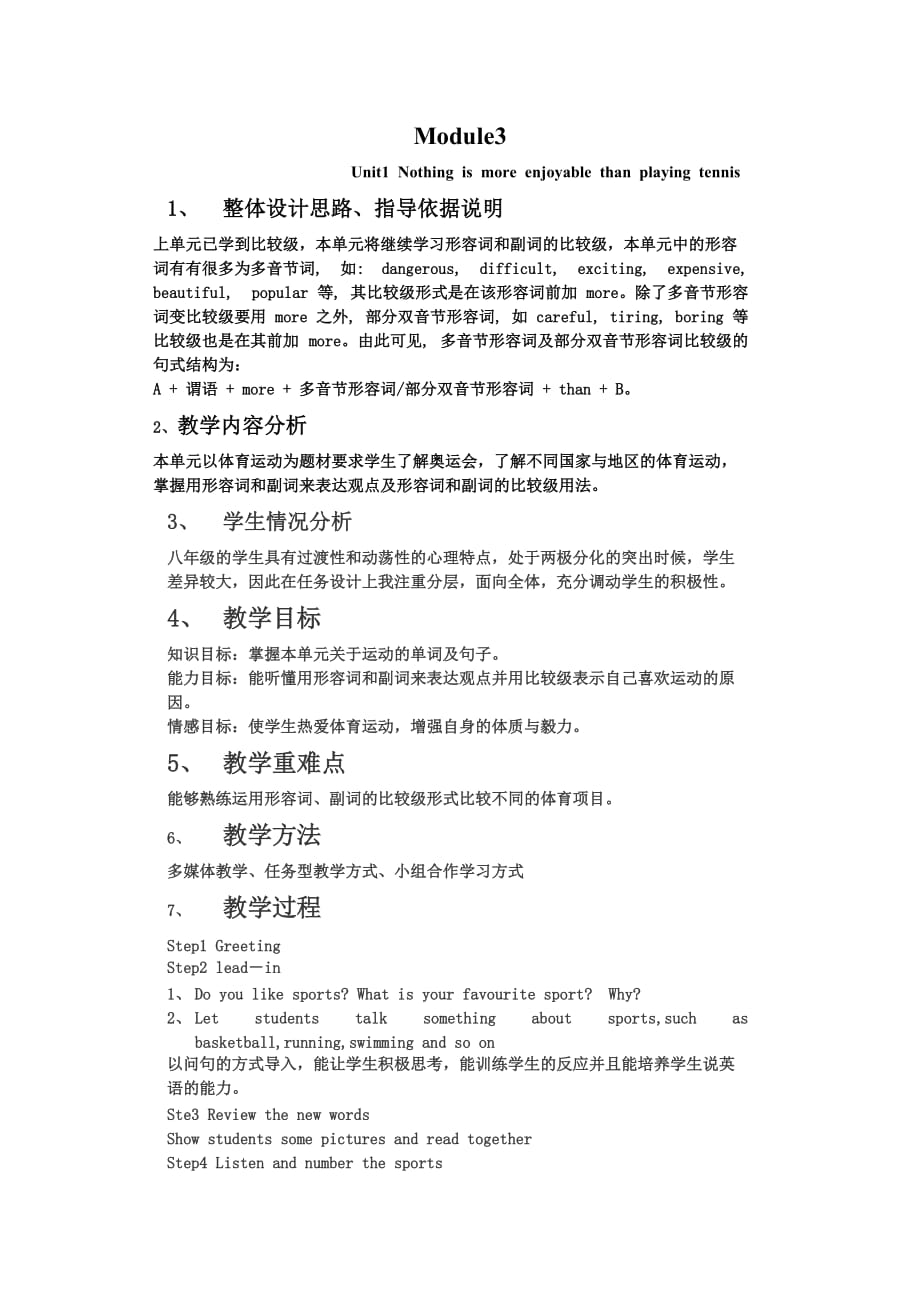《外研版八年級(jí)英語上冊(cè)Module 3 unit1 Nothing is more enjoyable than playing tennis.教案2》由會(huì)員分享��,可在線閱讀���,更多相關(guān)《外研版八年級(jí)英語上冊(cè)Module 3 unit1 Nothing is more enjoyable than playing tennis.教案2(3頁珍藏版)》請(qǐng)?jiān)谘b配圖網(wǎng)上搜索。
1���、Module3
Unit1 Nothing is more enjoyable than playing tennis
1�����、 整體設(shè)計(jì)思路��、指導(dǎo)依據(jù)說明
上單元已學(xué)到比較級(jí),本單元將繼續(xù)學(xué)習(xí)形容詞和副詞的比較級(jí)����,本單元中的形容詞有有很多為多音節(jié)詞, 如: dangerous, difficult, exciting, expensive, beautiful, popular 等, 其比較級(jí)形式是在該形容詞前加 more�����。除了多音節(jié)形容詞變比較級(jí)要用 more 之外, 部分雙音節(jié)形容詞, 如 careful, tiring, bori
2���、ng 等比較級(jí)也是在其前加 more�����。由此可見, 多音節(jié)形容詞及部分雙音節(jié)形容詞比較級(jí)的句式結(jié)構(gòu)為:
A + 謂語 + more + 多音節(jié)形容詞/部分雙音節(jié)形容詞 + than + B���。
2�、教學(xué)內(nèi)容分析
本單元以體育運(yùn)動(dòng)為題材要求學(xué)生了解奧運(yùn)會(huì),了解不同國(guó)家與地區(qū)的體育運(yùn)動(dòng)�����,掌握用形容詞和副詞來表達(dá)觀點(diǎn)及形容詞和副詞的比較級(jí)用法���。
3����、 學(xué)生情況分析
八年級(jí)的學(xué)生具有過渡性和動(dòng)蕩性的心理特點(diǎn)���,處于兩極分化的突出時(shí)候���,學(xué)生差異較大,因此在任務(wù)設(shè)計(jì)上我注重分層����,面向全體��,充分調(diào)動(dòng)學(xué)生的積極性���。
4�、 教學(xué)目標(biāo)
知識(shí)目標(biāo):掌握本單元關(guān)于運(yùn)動(dòng)的單詞及句子���。
能力目標(biāo):能聽懂用形容
3、詞和副詞來表達(dá)觀點(diǎn)并用比較級(jí)表示自己喜歡運(yùn)動(dòng)的原因��。
情感目標(biāo):使學(xué)生熱愛體育運(yùn)動(dòng)��,增強(qiáng)自身的體質(zhì)與毅力��。
5�、 教學(xué)重難點(diǎn)
能夠熟練運(yùn)用形容詞�����、副詞的比較級(jí)形式比較不同的體育項(xiàng)目����。
6、 教學(xué)方法
多媒體教學(xué)����、任務(wù)型教學(xué)方式、小組合作學(xué)習(xí)方式
7��、 教學(xué)過程
Step1 Greeting
Step2 lead-in
1���、 Do you like sports? What is your favourite sport? Why?
2、 Let students talk something about sports,such as basketball,running,
4、swimming and so on
以問句的方式導(dǎo)入�,能讓學(xué)生積極思考�,能訓(xùn)練學(xué)生的反應(yīng)并且能培養(yǎng)學(xué)生說英語的能力。
Ste3 Review the new words
Show students some pictures and read together
Step4 Listen and number the sports
Step5 Match the words with the pictures
Step6 Look at the sports in Activity1 and talk about them.
e.g.I like swimming because
5��、 it is relaxing.
先聽后說�����,引導(dǎo)學(xué)生聽完后���,談?wù)搱D片,訓(xùn)練說的能力��,也能更好地掌握新單詞和句型��。
Step7 Listen and answer
1��、What is the matter with Tony?
2����、How was last weeks match?
讓學(xué)生帶著問題去聽課文,從聽覺上對(duì)課文有初步的理解����,同時(shí)培養(yǎng)學(xué)生通過聽獲取信息的能力。
Step8 Listen and read
1�、 Just listen first
2���、 Listen and follow the tape
3�、 Read together
4��、 Read
6�����、 and check the true sentences
讓學(xué)生通過聽和跟讀課文��,能讓學(xué)生對(duì)課文熟悉并且能夠完成書本的練習(xí)���,培養(yǎng)學(xué)生通過讀獲取信息的能力。
Step9 Language points and exercises﹙讓學(xué)生通過練習(xí)掌握所學(xué)的比較級(jí)﹚
Step10 Practice
Look at the pictures and talk
Step11 Do some exercises
1��、 Complete the sentences with the words in the box
讓學(xué)生通過練習(xí)掌握所學(xué)的單詞
2�、 Complete the passa
7�、ge about youeself
讓學(xué)生根據(jù)自己的情況完成文段�����,并能夠了解他人的情況�����。
Step12 Summary
T:What have we learn today?
Ss:...
引導(dǎo)學(xué)生對(duì)這節(jié)課的總結(jié)���,讓學(xué)生自由發(fā)言,培養(yǎng)學(xué)生自主學(xué)習(xí)的好習(xí)慣����。
8、 教學(xué)評(píng)價(jià)設(shè)計(jì)
評(píng)價(jià)內(nèi)容:
〔1〕 學(xué)習(xí)興趣��。學(xué)生是否有濃厚的學(xué)習(xí)興趣�����。
〔2〕 情感��、策略發(fā)展?fàn)顟B(tài)�����。在學(xué)生課堂聽講、回答問題以及對(duì)話表演����、小組討論等活動(dòng)中觀察學(xué)生的主動(dòng)學(xué)習(xí)態(tài)度和合作學(xué)習(xí)情況。
〔3〕 所學(xué)語言知識(shí)和技能的掌握情況�����。
〔4〕 綜合語言知識(shí)和技能的運(yùn)用能力�����。
評(píng)價(jià)方法:
〔1〕 自我評(píng)價(jià)�����。學(xué)生自
8�����、己進(jìn)行反思�。
〔2〕 互相評(píng)價(jià)���。以小組為單位���,對(duì)學(xué)習(xí)過程及效果作評(píng)價(jià)�����。
〔3〕 教師評(píng)價(jià)�。
9�����、 板書設(shè)計(jì)
Module3
Unit1 Nothing is more enjoyable than playing tennis
Football is more exciting than basketball.
Staying at home is easier than going to the stadium.
10��、 作業(yè)設(shè)計(jì)
Look at the table about sports.Write sentences comparing any two sports
9��、
Eg. Football is more popular than cycling.
football
cycling
running
popular
*****
***
***
dangerous
***
*
*
exciting
*****
***
****
tiring
*****
***
****
expensive
*
***
*
11、 反思
英語教學(xué)提倡體驗(yàn)���、實(shí)踐���、參與、交流與合作的學(xué)習(xí)方式�,要使學(xué)生盡可能多地從不同的方式學(xué)習(xí)語言,親身感受和直接體驗(yàn)語言��,在互動(dòng)中交流語言�����,在體驗(yàn)中生成知識(shí)���,使語言的學(xué)習(xí)轉(zhuǎn)變成一種創(chuàng)造和運(yùn)用語言的體驗(yàn)過程�。
 外研版八年級(jí)英語上冊(cè)Module 3 unit1 Nothing is more enjoyable than playing tennis.教案2
外研版八年級(jí)英語上冊(cè)Module 3 unit1 Nothing is more enjoyable than playing tennis.教案2

